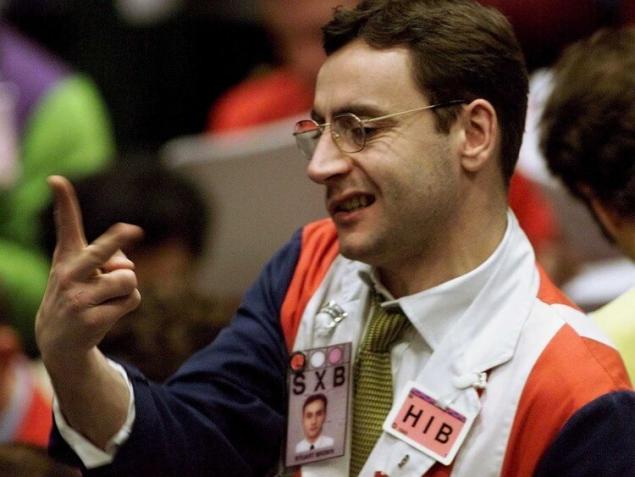614
How the brain prevents you from being a good investor
Here are seven common behavioral biases that drive the decisions of investors. Read about them, and will quickly understand why good financial decisions are so bad.
No matter how rational you think you are. You have a brain, and the chemicals often cause you to act irrational. This affects all the decisions — and in your personal life, and in regard to the investment portfolio.
Meir Statman, one of the leading thinkers in the field of behavioral Economics, says:
"Investors are normal, not rational people."
Behavioral Economics is a rapidly developing discipline, which is set high in order to eliminate the discrepancy between rational assessment and irrational market pricing. Among the gurus of behavioural Economics, which you may have heard of is Richard Thaler from the University of Chicago, Nobel prize winners Robert Shiller and Daniel Kahneman and head of Credit Suisse Michael Mauboussin.
Here are seven common behavioral biases that drive the decisions of investors. Read about them, and will quickly understand why good financial decisions are so bad.
1. Investors believe that they are geniuses investment

Over-confidence over-confidence perhaps the most obvious behavioral Finance concept. If you are too confident in their ability to predict the outcome of investment decisions, this is about you.
Overconfident investors often do not pay enough attention to diversification and, consequently, more susceptible to volatility.
2. Investors badly treated new informationAttachment to irrelevant solutions Attachment decisions have lost relevance, is directly connected with excessive confidence. For example, you made a investment decision based on the information available at the moment. Later you find out news that could significantly affect the original forecast. But instead of a new analysis, you simply decide to revise the old.
You are still tied to the old ideas, and even the revised analysis will not fully reflect the new information.
3. Investors incorrectly see the connection between the events of themargin of Error
Company can a few blocks in a row to report a substantial profit. As a consequence, you are assuming that the next report will probably be on the level. This error falls under a very broad behavioral Finance concept called "margin of error": you mistakenly believe that some event means something else.
Another example of coverage error — the assumption that a good company means a good stock.
4. Investors hate to lose moneyloss Aversion , the Unwillingness to take losses sometimes fatal. For example, one of the investments in your portfolio can any good reason to lose 20% of the cost. The best solution in this situation is to take your loss and move on. But you can't get out of my head the idea that the paper will return to their positions.
To think so is dangerous because it leads to a build-up of positions in an unprofitable investment. So you're starting to resemble a gambler who makes a bet after bet hoping to win.
5. Investors do not know how to forget past mistakes

Minimization of the loss of the Results of past trades often affect how you will trade in the future. Imagine you sold stocks when they rose by 20%, and they continued to go up. You say to yourself, "If only I waited a little bit". Or suppose one of your investment depreciates and you lament that you didn't sell him when he still cost quite. All this leads to unpleasant feelings of frustration.
Minimizing regrets — the behavior in which you generally avoid investments or invest very conservatively because they are afraid to feel the bitter taste of disappointment.
6. Investors like to go with the flowdepending on the circumstances , Your risk tolerance should determine your personal financial opportunities, investment horizon, as well as the relative weight of investments in the portfolio. Depending on the circumstances — the concept that your tolerance for risk based on how the market behaves. For example, when markets fall, may fall, and your willingness to risk and when the market is on the rise, you are ready to risk more.
This is what makes investors to buy above and sell below.
7. Investors are perfectly able to come up with otoparkiMechanisms of self-defense Sometimes you lose money. Of course, it's not your fault, right? Protective mechanisms, which manifest as self-justification, which is closely associated with excessive self-confidence. Here are a few popular excuses:
Source: insider.pro/EN/article/53536/
No matter how rational you think you are. You have a brain, and the chemicals often cause you to act irrational. This affects all the decisions — and in your personal life, and in regard to the investment portfolio.
Meir Statman, one of the leading thinkers in the field of behavioral Economics, says:
"Investors are normal, not rational people."
Behavioral Economics is a rapidly developing discipline, which is set high in order to eliminate the discrepancy between rational assessment and irrational market pricing. Among the gurus of behavioural Economics, which you may have heard of is Richard Thaler from the University of Chicago, Nobel prize winners Robert Shiller and Daniel Kahneman and head of Credit Suisse Michael Mauboussin.
Here are seven common behavioral biases that drive the decisions of investors. Read about them, and will quickly understand why good financial decisions are so bad.
1. Investors believe that they are geniuses investment

Over-confidence over-confidence perhaps the most obvious behavioral Finance concept. If you are too confident in their ability to predict the outcome of investment decisions, this is about you.
Overconfident investors often do not pay enough attention to diversification and, consequently, more susceptible to volatility.
2. Investors badly treated new informationAttachment to irrelevant solutions Attachment decisions have lost relevance, is directly connected with excessive confidence. For example, you made a investment decision based on the information available at the moment. Later you find out news that could significantly affect the original forecast. But instead of a new analysis, you simply decide to revise the old.
You are still tied to the old ideas, and even the revised analysis will not fully reflect the new information.
3. Investors incorrectly see the connection between the events of themargin of Error
Company can a few blocks in a row to report a substantial profit. As a consequence, you are assuming that the next report will probably be on the level. This error falls under a very broad behavioral Finance concept called "margin of error": you mistakenly believe that some event means something else.
Another example of coverage error — the assumption that a good company means a good stock.
4. Investors hate to lose moneyloss Aversion , the Unwillingness to take losses sometimes fatal. For example, one of the investments in your portfolio can any good reason to lose 20% of the cost. The best solution in this situation is to take your loss and move on. But you can't get out of my head the idea that the paper will return to their positions.
To think so is dangerous because it leads to a build-up of positions in an unprofitable investment. So you're starting to resemble a gambler who makes a bet after bet hoping to win.
5. Investors do not know how to forget past mistakes

Minimization of the loss of the Results of past trades often affect how you will trade in the future. Imagine you sold stocks when they rose by 20%, and they continued to go up. You say to yourself, "If only I waited a little bit". Or suppose one of your investment depreciates and you lament that you didn't sell him when he still cost quite. All this leads to unpleasant feelings of frustration.
Minimizing regrets — the behavior in which you generally avoid investments or invest very conservatively because they are afraid to feel the bitter taste of disappointment.
6. Investors like to go with the flowdepending on the circumstances , Your risk tolerance should determine your personal financial opportunities, investment horizon, as well as the relative weight of investments in the portfolio. Depending on the circumstances — the concept that your tolerance for risk based on how the market behaves. For example, when markets fall, may fall, and your willingness to risk and when the market is on the rise, you are ready to risk more.
This is what makes investors to buy above and sell below.
7. Investors are perfectly able to come up with otoparkiMechanisms of self-defense Sometimes you lose money. Of course, it's not your fault, right? Protective mechanisms, which manifest as self-justification, which is closely associated with excessive self-confidence. Here are a few popular excuses:
- "If only": If only not happened one thing, I would have been right. Unfortunately, you can't prove it.
- "Almost got it": Unfortunately, at times almost to be able to do something is not enough.
- "The time has not yet come": unfortunately, "markets can remain irrational longer than you can remain solvent."
- "One wrong": if you did fail at something, it does not mean that the rest too would be wrong, right? published
P. S. And remember, only by changing their consumption — together we change the world! ©
Join us in Facebook , Vkontakte, Odnoklassniki
Source: insider.pro/EN/article/53536/























